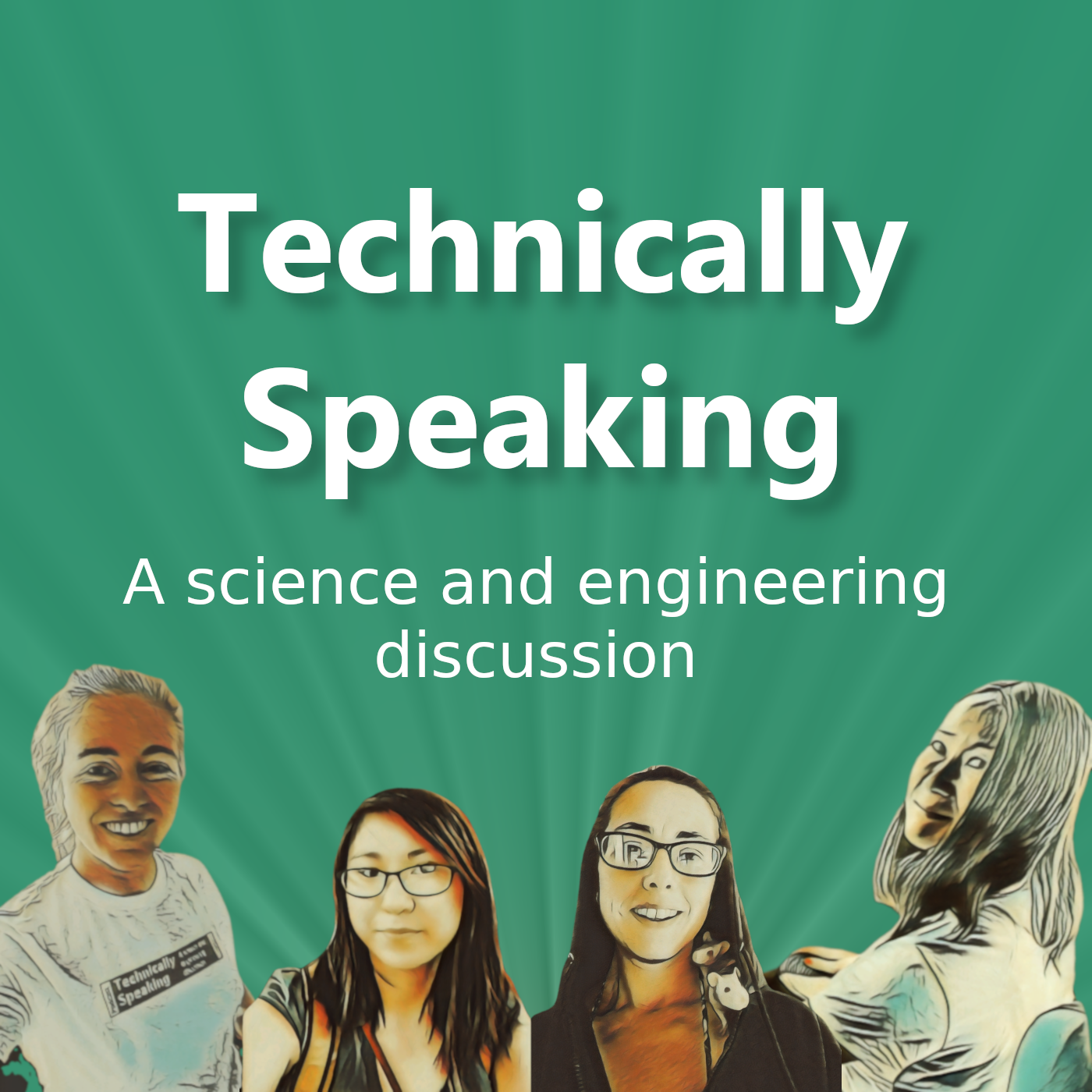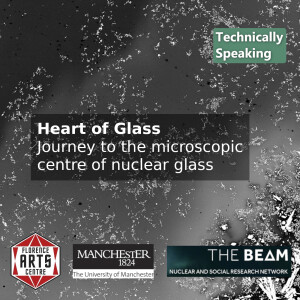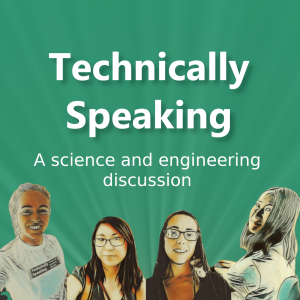

17.1K
Downloads
125
Episodes
Dive deep into the world of science and engineering with engaging discussions and thought provoking debates. The team share insights from careers in science and engineering, combining expert knowledge and scientific thinking with a touch of humour to make even the most complex topics accessible and entertaining for both enthusiasts and casual listeners. Sometimes we’re funny, often we’re opinionated, always we’re entertaining. Support us: https://ko-fi.com/techspeak_podcast X/Twitter: @TechnicallySp11 Instagram: technicallyspeaking.podcast Reddit: techspeak_podcast Email: techspeak.podcast@gmail.com
Dive deep into the world of science and engineering with engaging discussions and thought provoking debates. The team share insights from careers in science and engineering, combining expert knowledge and scientific thinking with a touch of humour to make even the most complex topics accessible and entertaining for both enthusiasts and casual listeners. Sometimes we’re funny, often we’re opinionated, always we’re entertaining. Support us: https://ko-fi.com/techspeak_podcast X/Twitter: @TechnicallySp11 Instagram: technicallyspeaking.podcast Reddit: techspeak_podcast Email: techspeak.podcast@gmail.com
Episodes

Thursday Mar 16, 2023
Heart of Glass: Creativity in art and science
Thursday Mar 16, 2023
Thursday Mar 16, 2023
You may not realise it but scientists are just as creative as artists. Laura is joined by Tamas Zagyva, a research associate at Imperial College London, and Bridget Kennedy, an artist and lecturer in fine art at Newcastle University, to talk about how they find inspiration, what sort of emotions their work evokes, and what sort of skills are required in their respective disciplines.
Heart of Glass is an exhibition at Florence Arts Centre in Egremont, West Cumbria, UK. The exhibition is on 24th March to 30th June and features images taken at a microscopic scale of nuclear waste glass.
The exhibition is supported by The University of Manchester and involves The BEAM nuclear and social research network.

Thursday Mar 09, 2023
Heart of Glass: The science of vitrification
Thursday Mar 09, 2023
Thursday Mar 09, 2023
Vitrification – the process of making glass – is used to immobilise nuclear waste and also happens naturally in the earth. Laura talks to Tracey Taylor from the UK’s National Nuclear Laboratory about the glass making process and to Brian O’Driscoll, a geologist from the University of Ottawa in Canada, about natural glass and why researching this material is so important.
Heart of Glass is an exhibition at Florence Arts Centre in Egremont, West Cumbria, UK. The exhibition is on 24th March to 30th June and features images taken at a microscopic scale of nuclear waste glass.
The exhibition is supported by The University of Manchester and involves The BEAM nuclear and social research network.

Thursday Mar 02, 2023
Hot news!
Thursday Mar 02, 2023
Thursday Mar 02, 2023
We're part of an exhibition where science becomes art!
Heart of Glass is an exhibition at Florence Arts Centre in Egremont, West Cumbria, UK. The exhibition is on 24th March to 30th June and features images taken at a microscopic scale of nuclear waste glass.
The exhibition is supported by The University of Manchester and involves The BEAM nuclear and social research network.

Thursday Feb 23, 2023
How does materials science affect our lives?
Thursday Feb 23, 2023
Thursday Feb 23, 2023
It may not be a very well-known discipline but materials science is really important. Laura, Jasmin and Emma discuss how graphene is made, what makes it a wonder material, what it can be used for and how it can contribute to making environmentally friendly products. They also talk about a much more mature material which influenced the second industrial revolution: steel. This alloy might be old technology but it’s vital for modern life.
This episode was recorded with an audience from the Engineering Development Trust's Routes to STEM course.

Thursday Feb 09, 2023
What is the next industrial revolution?
Thursday Feb 09, 2023
Thursday Feb 09, 2023
There’s a technology boom (!) and loads of buzzwords surround it including I4.0, big data, and digital twin. Laura and Antonia are joined by special guest Matt, from the Nuclear Institute, to talk about what these things really mean and to try and define them. They also talk about how the nuclear industry is starting to embrace these new technologies, ushering a renaissance of nuclear power that builds on the vast expertise gained since the original reactors were built in 1950s and combines it with cutting edge technology.

Thursday Jan 26, 2023
How do we account for the risks of climate change in future infrastructure?
Thursday Jan 26, 2023
Thursday Jan 26, 2023
To mark our 50th episode we're revisiting the topic of our first ever episode with a fresh perspective. Laura, Antonia, Rwayda and Jasmin talk about how much the climate will change, how we can have confidence in the climate models, and what civil engineers must do to adapt infrastrucutre like roads and buildings to minimise future risks from the changed climate. They also discuss the perception of risk and how this can influence the decisions that are made.

Thursday Jan 12, 2023
How does fake meat compare to the real thing?
Thursday Jan 12, 2023
Thursday Jan 12, 2023
Loads of alternatives to meat are appearing but what's in them and how are they made? Laura, Ellie and Jasmin discuss their preferences, look at how minced beef is made, compare nutritional factors and speculate on what the future might hold. They also ask existential questions like what is meat anyway and when is a sausage not a sausage?
Laura did way more research than the team could include in this episode. Read it here.

Thursday Dec 15, 2022
How do you bring science to life through film?
Thursday Dec 15, 2022
Thursday Dec 15, 2022
Ever wondered what it’s like to work on a documentary? Antonia asks Ellie and Laura about their experiences of working on TV or as a consultant science communicator. They talk about how they got into science communication, what their role was on the various shows they’ve worked on, and how you tell a compelling story.

Thursday Dec 01, 2022
Is importing wood for electricity production sustainable?
Thursday Dec 01, 2022
Thursday Dec 01, 2022
Some power stations in the UK that originally burned coal have switched to burning wood pellets. These are usually imported and of course, cutting down forests can lead to loss of habitat. Laura, Antonia and Jasmin discuss greenhouse gas emissions from burning wood and coal, talk about responsible forest management, and discuss how important biomass is for the UK's electricity supply. These discussion points, and more, were inspired by a recent BBC Panorama documentary, "The Green Energy Scandal Exposed".
Read a summary of this episode here.

Thursday Nov 17, 2022
Should we bring back extinct species?
Thursday Nov 17, 2022
Thursday Nov 17, 2022
The TIGRR lab in Melbourne has recently announced plans to use genetic material from an extinct animal – the thylacine or Tasmanian tiger – to bring this species back while some crime fighting organisations are investing in genetic technology that could bring back the woolly mammoth. Weird right? Antonia, Ellie and Laura discuss extinction, climate change, and habitat loss while also debating whether this genetic research is a good idea or whether efforts should focus on saving the species that are about to go extinct. Just why is the FBI investing in genetics research?
Ellie mentions the IUCN: the International Union for Conservation of Nature.
Antonia mentions the IPCC: the Intergovernmental Panel on Climate Change.
Laura mentions COP26: the Conference of the Parties 26th annual climate change conference.